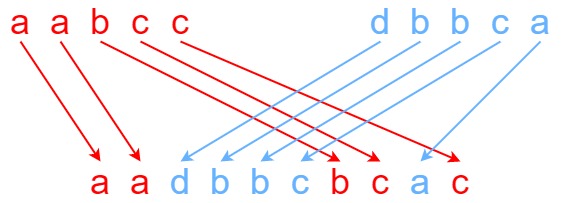Problem: Given strings s1, s2, and s3, find whether s3 is formed by an interleaving of s1 and s2.
An interleaving of two strings s and t is a configuration where s and t are divided into n and m substrings respectively, such that:
- s = s1 + s2 + ... + sn
- t = t1 + t2 + ... + tm
- | n - m | <= l
- The interleaving is s1 + t1 + s2 + t2 + s3 + t3 + ... or t1 + s1 + t2 + s2 + t3 + s3 + ...
Note: a + b is the concatenation of strings a and b.
Example:

Input: s1 = "aabcc", s2 = "dbbca", s3 = "aadbbcbcac" Output: true Explanation: One way to obtain s3 is: Split s1 into s1 = "aa" + "bc" + "c", and s2 into s2 = "dbbc" + "a". Interleaving the two splits, we get "aa" + "dbbc" + "bc" + "a" + "c" = "aadbbcbcac". Since s3 can be obtained by interleaving s1 and s2, we return true.
Input: s1 = "aabcc", s2 = "dbbca", s3 = "aadbbbaccc" Output: false Explanation: Notice how it is impossible to interleave s2 with any other string to obtain s3.
Input: s1 = "", s2 = "", s3 = "" Output: true
Implementation in C#:
public bool IsInterleave(string s1, string s2, string s3)
{
if (s1.Length + s2.Length != s3.Length)
{
return false;
}
bool[,] table = new bool[s1.Length + 1, s2.Length + 1];
for (int i = 0; i <= s1.Length; ++i)
{
for (int j = 0; j <= s2.Length; ++j)
{
if (i == 0 && j == 0)
{
table[i, j] = true;
}
else if (i == 0)
{
table[i, j] = table[i, j - 1] && s2[j - 1] == s3[i + j - 1];
}
else if (j == 0)
{
table[i, j] = table[i - 1, j] && s1[i - 1] == s3[i + j - 1];
}
else
{
table[i, j] = (table[i - 1, j] && s1[i - 1] == s3[i + j - 1]) || (table[i, j - 1] && s2[j - 1] == s3[i + j - 1]);
}
}
}
return table[s1.Length, s2.Length];
}
Complexity: O(m * n)
No comments:
Post a Comment